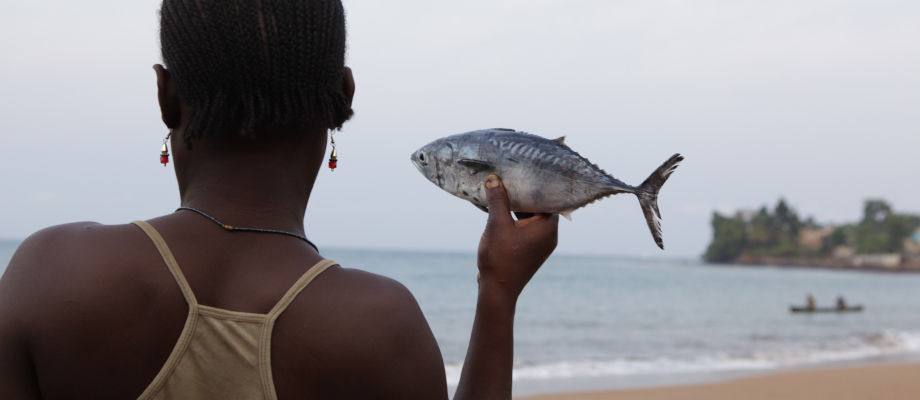Paving the way for a more sustainable fisheries sector in São Tomé and Príncipe

22 February 2024, São Tomé and Príncipe – In a landmark partnership, the EAF-Nansen Programme and the Development Law Service (LEGN) at FAO, have assisted the Directorate of Fisheries and Aquaculture of São Tomé and Príncipe in bolstering the fisheries sector by reviewing the country's draft General Regulation on Fishing Activities.
Following a National Workshop for the presentation to the relevant stakeholders and validation of the revised draft of the General Regulations on Fishing Activities held from 17 to 18 of October 2023 in São Tomé with the support of FAO, the final version of the Regulation was presented to the Minister of Agriculture, Rural Development and Fisheries (MARDF), Abel Bom Jesus, during a ceremony that brought together representatives from the Food and Agriculture Organization of the United Nations (FAO) office in São Tomé and Príncipe, the EAF-Nansen Programme and the Directorate of Fisheries and Aquaculture. During the event, the Director of Fisheries and Aquaculture of São Tomé and Príncipe submitted the Regulations to the Minister, who expressed appreciation for FAO’s support in the preparation of this legal instrument, which regulates the Fisheries and Aquaculture Law of 2022. It will now be submitted to the Council of Ministers for approval before entering into force.
The Ministry's Directorate for Fisheries and Aquaculture requested the review following an assessment of the alignment of selected policy and legal instruments of São Tomé and Príncipe with the ecosystem approach to fisheries (EAF). This resulted in recommendations that were presented in the Legal Report on the Ecosystem Approach to Fisheries in São Tomé and Príncipe endorsed by the MARDF and published by FAO in 2023.
In São Tomé and Príncipe, an island nation in the Gulf of Guinea off the coast of Gabon, the fisheries sector provides jobs for thousands of people and represents the main revenue source for low-income families.
One way to increase catches while maintaining a healthy and productive state of marine resources is with the EAF. This is a holistic and risk-based management approach that FAO considers to be the principal framework for achieving sustainable fisheries.
The EAF-Nansen Programme will continue to assist the Directorate of Fisheries and Aquaculture in strengthening the policy and legal frameworks in line with the EAF. This will include the elaboration of a 10-year national plan for the development of the fisheries and aquaculture sector, the amendment of the Fisheries and Aquaculture Law of 2022 and the drafting of additional subsidiary legislation to the General Regulation on Fishing Activities.
Lionel Kinadjian, the Fisheries and Aquaculture Officer at the FAO Subregional Office for Central Africa, expressed FAO's enthusiasm in assisting São Tomé and Príncipe in developing a sustainable and resilient fisheries sector. “The effort is at the forefront of the Blue Transformation vision, which aims at creating sustainable aquatic food systems able to eradicate hunger, alleviate poverty, and stimulate economic growth,” he said.
About the Programme
The EAF-Nansen Programme is a longstanding partnership between FAO and Norway, dating back to 1975. It is implemented by FAO in close collaboration with the Institute of Marine Research in Norway (IMR) and funded by the Norwegian Agency for Development Cooperation (Norad).
In collaboration with 32 countries across Africa and the Bay of Bengal, the Programme is improving fisheries policies and management practices in line with the ecosystem approach to fisheries and developing the capacity of fisheries institutions to ensure sustainable fisheries management.
